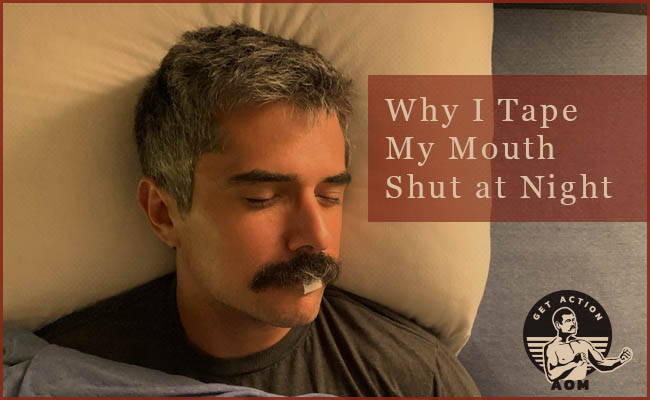
My bedtime routine for the past month or so has looked like this:
Take out contacts. Brush and floss teeth. Say prayers. Read a book. Tape mouth shut.
*Record scratch*
“Tape your mouth shut? Really, Brett? You weirdo.”
Yes, it is weird, but there’s a method to my weirdness.
I got the idea from reading Breath: The New Science of a Lost Art, in preparation for interviewing its author, James Nestor, for the podcast. In the book and in our interview, Nestor shares research on how breathing out of your mouth is bad for you, especially while you’re sleeping. He then shares an easy tip on how you can fix your chronic mouth breathing at night: taping your kisser shut.
Here’s why it works, and why, the initial weirdness factor aside, you might consider trying it yourself.
The Downsides of Nighttime Mouth Breathing
When Nestor dug into the research on breathing, he found that for thousands of years, and in diverse cultures around the world, the nose had been favored over the mouth as the primary pathway for inhalation. Air breathed through the former is richer in oxygen, and gets moistened and filtered in the nasal passages. Breathing through the mouth, on the other hand, lacks these benefits, and when engaged in excessively at night, can create the following problems:
Snoring. Inhaling air through your mouth vibrates the soft tissue in the back of your throat more than inhaling air through your nose does, and this vibration can result in snoring. What’s more, when you breathe through your open mouth, your tongue falls back into your throat, narrowing your airway. With your airway constricted, the air you breathe in is even more likely to generate snore-inducing reverberations in the tissue of the throat.
Snoring doesn’t just annoy your spouse; it can also be a sign of a more serious sleep issue, specifically . . .
Sleep apnea. Sleep apnea is a disorder in which your breathing is disrupted while you sleep. You experience periods in which your breathing pauses or becomes very shallow more often than is usual, and these cessations in breathing make your sleep less restful and restorative, leading to myriad health problems, including fatigue, high blood pressure, stress, depression, and headaches.
Mouth breathing at night is a significant contributor to sleep apnea. As discussed above, when you breathe through your mouth while you slumber, the airway in your throat constricts, causing snoring. When the soft tissue in the back of your throat collapses completely, your airway is obstructed, and you experience sleep apnea.
Nestor experienced this firsthand during an experiment he ran on himself in which he had his nose entirely plugged up by a doctor, and could only breathe through his mouth for 10 days. Having previously been only an occasional snorer, he began to snore for four hours each night and even started developing obstructive sleep apnea. Tests showed his body was under greater stress throughout his waking hours, and his blood pressure shot up 13 points, putting him in stage one hypertension. He also felt especially fatigued during the day.
Bad breath. If, upon waking, your breath smells like you ate a dirty diaper, it’s probably because you slept with your mouth open all night. Saliva is nature’s mouthwash. It has antibacterial
No comments:
Post a Comment